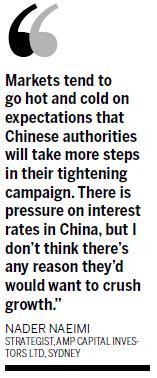TOKYO - Asian stocks fluctuated last week as Japanese and Australian benchmark indexes rose after reports showed better-than-estimated economic growth or employment, while China-related companies fell on concern policy makers will raise interest rates to slow inflation.

Mitsubishi UFJ Financial Group Inc, Japan's biggest publicly traded bank, climbed 4.2 percent. Westpac Banking Corp, Australia's second-largest bank by market value, gained 2.9 percent. Industrial & Commercial Bank of China Ltd, the world's biggest bank by market value, declined 2.5 percent in Hong Kong and Agricultural Bank of China Ltd, the nation's third-largest lender, tumbled 5.1 percent.
"Markets tend to go hot and cold on expectations Chinese authorities will take more steps in their tightening campaign," said Nader Naeimi, a strategist at AMP Capital Investors Ltd, which manages about $93 billion and is a unit of AMP Ltd, Australia's second-largest asset manager. "There is pressure on interest rates in China, but I don't think there's any reason they'd would want to crush growth."
The MSCI Asia Pacific Index fell 0.3 percent to 133.09 last week, holding near a one-month high. It jumped 3.5 percent the previous week after three straight weekly drops in which it lost 4.4 percent. The index has rallied about 22 percent from this year's low on May 25.
Japan's Nikkei 225 Stock Average rose 0.3 percent last week. Gross domestic product grew at an annualized 4.5 percent rate in the three months ending Sept 30, faster than the 3.9 percent reported last month, the Cabinet Office said on Dec 9. The median forecast of 19 economists surveyed by Bloomberg News was for a 4.1 percent expansion.
"Investors already knew higher capital spending in the July-September period would boost Japan's GDP, but they took it as a good direction once the result was disclosed," said Masaru Hamasaki, who helps oversee about $17 billion as chief strategist at Toyota Asset Management Co in Tokyo.
Australia's S&P/ASX 200 Index climbed 0.9 percent. The number of people employed gained 54,600 from October, the statistics bureau said on Dec 9. That compares with the median forecast for a 20,000 increase in a Bloomberg survey of 26 economists. The jobless rate fell to 5.2 percent from 5.4 percent a month earlier.
Hong Kong's Hang Seng Index retreated 0.7 percent. China's Shanghai Composite Index fell less than 0.1 percent. Mitsubishi UFJ Financial climbed 4.2 percent to 419 yen in Tokyo last week. Nippon Steel Corp, Japan's biggest steelmaker, advanced 3.9 percent to 293 yen. Westpac increased 2.9 percent to A$22.57 in Sydney, and Commonwealth Bank of Australia gained 2.4 percent to A$50.59. Also in Tokyo, Sumco Corp tumbled 18 percent to 1,103 yen, last week's biggest percentage drop on the MSCI Asia Pacific Index. The company widened its full-year net-loss forecast and Credit Suisse Group AG cut its rating on the shares to "underperform" from "neutral".
The MSCI Asia Pacific Index has gained about 11 percent this year as economic data and corporate earnings helped overcome concern that China's steps to curb property prices and Europe's government-debt crisis will hamper a global economic recovery. Stocks on the gauge are valued at about 14.7 times estimated earnings on average, compared with 23 times at the start of the year.
Chinese developers and banks declined last week after the statistics bureau brought forward the release of economic data, including inflation, by two days to Dec 11. The move signals an interest rate increase may be imminent, said Glenn Maguire, chief economist for Asia at Societe Generale SA.
Bloomberg News





